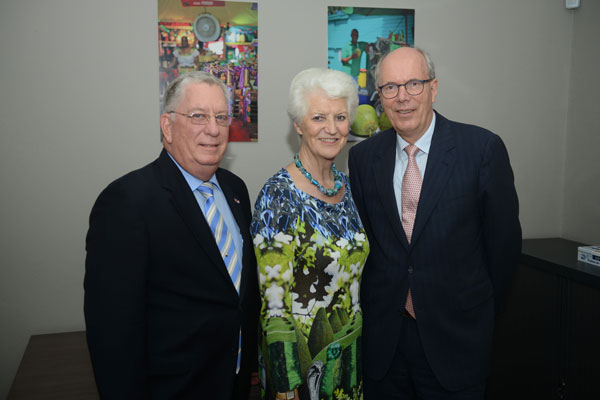 Oranjestad:--- On December 10, 11 and 14, the Board of financial supervision Aruba (CAft) visited Aruba. The consultations that the CAft held were largely about the execution of the 2015 budget and the planning of the adoption of the 2016 budget. In addition, the Public Works Department (DOW) held a presentation for the CAft on infrastructure projects in the form of Public Private Partnerships (PPP’s) which are carried out. According CAft chairman Age Bakker - in line with the agreements established in the Balanced Budget Agreement (BBA) – on an administrative level steps are made in the right direction in order to improve the Aruban public finances. Nevertheless, the budget is not yet sustainable in the long run. So in order to achieve the deficit norms established by Aruba for 2015 and subsequent years, a reinforced and broad-based effort is required.
Oranjestad:--- On December 10, 11 and 14, the Board of financial supervision Aruba (CAft) visited Aruba. The consultations that the CAft held were largely about the execution of the 2015 budget and the planning of the adoption of the 2016 budget. In addition, the Public Works Department (DOW) held a presentation for the CAft on infrastructure projects in the form of Public Private Partnerships (PPP’s) which are carried out. According CAft chairman Age Bakker - in line with the agreements established in the Balanced Budget Agreement (BBA) – on an administrative level steps are made in the right direction in order to improve the Aruban public finances. Nevertheless, the budget is not yet sustainable in the long run. So in order to achieve the deficit norms established by Aruba for 2015 and subsequent years, a reinforced and broad-based effort is required.
Consultations CAft
During the first day on Aruba, the chairman and the Board members visited the Advisory Council of Aruba, followed by attendance of a presentation of the DOW on PPPs. During this presentation, the Board members were informed in detail about the two major ring road projects in Aruba: the Green Corridor which is under construction since the third quarter of 2015, and the Watty Vos Boulevard, of which the construction is scheduled to begin around March 2016. Furthermore a visit was paid to the Governor, the Minister of Finance, the Council of Ministers and the Committee on Financial and Economic Affairs of Parliament. The Central Bank of Aruba was visited as well. During the deliberations of the CAft information was exchanged amongst others about the financial statements of 2014, the implementation report for the third quarter 2015, the first budget amendment of 2015 and the planning of the 2016 budget.
Third implementation report and first 2015 budget amendment
On November 17th, 2015 the CAft received the third implementation report of Aruba. In its advice, the CAft observes that the implementation of the consolidation measures up till September is lagging behind. In its opinion on the first budget amendment of Aruba, the CAft states that the spending growth is not under control, as can be deducted by the excesses that are expected by the end of 2015. Based hereon, extra efforts are required to reach the budget deficit of 3.7% that was planned for 2015.
2016 Budget
Despite the efforts that Aruba has made – which certainly includes the efforts at the official level - to comply with the agreements stated in the BBA, the CAft ascertains that the 2016 draft budget currently is not yet sustainable in the long run. Despite the enhancement of its information value, the budget still shows an excessive deficit. In its advice on the 2016 draft budget, the CAft calculates a deficit of 2.9% of the GDP, which is higher than the 2.0% Aruba is counting on. The CAft considers that the expected additional revenues from recovery measures are too optimistic. The expectation as indicated by Aruba itself is that the introduction of the General Expenditure Tax (ABB) in early 2016 will yield additional resources of approximately AWG 50 million, because of inherently higher compliance rates (compliance). On the basis hereof the CAft has recommended to finalize the relevant legislation as soon as possible. If that is not feasible, the CAft recommends for an amount of approximately 1% of GDP (approximately AWG 50 million) be adjusted in expenditures.
In accordance with the National Ordinance on Aruba Temporary Financial Supervision (LAft) the budget should be adopted at the latest by December 15th by Parliament. The government has requested an extension until January 31st, 2016 and in accordance with the Ordinance the CAft will advise the Kingdom Council of Minister positively about it. The preparation of the 2017 draft budget will have to be accelerated so that timely delivery is achieved by September 1st, 2016. In that case a timely adoption by Parliament before December 15st is achievable.